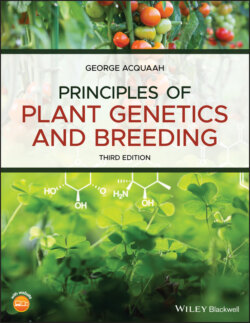Читать книгу Principles of Plant Genetics and Breeding - George Acquaah - Страница 314
7 Clonal propagation and in vitro culture Purpose and expected outcomes
ОглавлениеConventional plant breeding entails sexual recombination between plants to obtain novel and useful combinations of traits in the resulting new product that can be reproduced more or less “true to type.” Clonal propagation on the other hand does not entail recombination, but rather the asexual multiplication of plants such that uniformity and identity are preserved intact. Plant propagators and horticulturists commonly use clonal propagation in their operations. Sometimes, plant breeders need a large number of clones for genetic studies. Modern plant breeding tools such as biotechnology include the use of techniques for generating clones and for genetic modification under aseptic conditions.
After completing this chapter, the student should be able to discuss:
1 Micropropagation and its applications in breeding.
2 The importance of cell and tissue culture in plant breeding.
3 The characteristics of asexual propagation that have breeding implications.
4 Apomixis and the breeding of apomictic species.
5 The advantages and limitations of clonal propagation.
